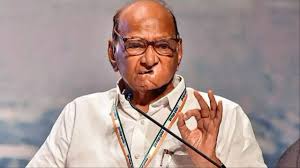Centre’s neutral stance on ‘aggression’ not in line with India’s traditional position: Sharad Pawar

Senior NCP leader Sharad Pawar has criticized the central government for staying neutral on global conflicts involving military aggression. He believes this position marks a shift from India’s traditional foreign policy, which supported peace, justice, and opposition to unprovoked wars.
At a public gathering in Pune, Pawar expressed disappointment with what he described as the government’s silence on major global issues. He argued that India has long played a moral role on the world stage, but recent decisions suggest a move away from those principles.
“India always spoke out against injustice. But now, we are silent even when innocent lives are lost,” Pawar said during his speech.
Implicit Reference to Ukraine War
While Pawar did not name any specific country or conflict, his remarks seemed to refer to the Russia-Ukraine war. Since the war began in early 2022, India has chosen a neutral path, abstaining from voting on UN resolutions that condemn Russia.
The government insists this approach protects national interests. However, critics like Pawar believe it weakens India’s moral authority. He pointed out that India’s past leaders stood firm on global issues, even when it meant going against powerful nations.
“Non-alignment meant independent thinking, not silence. We once had the courage to speak truth to power,” he said.
A Look at India’s Foreign Policy History
India’s global outlook has traditionally focused on justice, peace, and self-determination. During the Cold War, India helped lead the Non-Aligned Movement, refusing to side with either the U.S. or the Soviet Union.
But neutrality then did not mean ignoring wrongdoings. For instance, India supported African nations during their fight against apartheid. It condemned invasions, pushed for peaceful resolutions, and took bold stands during international crises.
Pawar reminded listeners of India’s role in supporting Bangladesh during its 1971 war of independence. “We acted then not out of political gain, but to stop human suffering. That was real leadership,” he said.
National Interest or Moral Compromise?
Supporters of the Modi government say its decisions reflect pragmatism. They argue that India must protect strategic and economic ties. Russia remains a key defence partner, and India relies heavily on Russian oil.
But Pawar believes diplomacy must also include ethical choices. He warned that by staying neutral, India may risk being seen as indifferent to international law.
“Every decision shapes how the world sees us. We cannot ignore violence and still expect to lead globally,” he said.
Opposition Leaders Raise Similar Concerns
Pawar isn’t alone in questioning India’s current foreign policy direction. Congress leaders like Shashi Tharoor and others have voiced concern over what they see as a softening of India’s commitment to international justice.
These leaders argue that India, as the world’s largest democracy, should stand with nations facing aggression. They believe silence sends the wrong message and could erode the country’s global influence.
Political observers note that this issue could become a point of debate in the lead-up to the next general elections. With foreign policy now part of public discourse, more leaders may start discussing India’s role in the world.
Balancing Act in a Complex World
Analysts remain divided on Pawar’s remarks. Some agree that India appears less vocal on global issues than before. Others say times have changed, and national interest must now take priority.
Foreign policy expert Raghav Menon said, “India’s past role was based on idealism. Today, the world demands more calculation. Still, the public has a right to expect consistency between values and actions.”
Even among diplomats, opinions differ. Some believe India’s stance on Ukraine helps it stay neutral for future negotiations. Others argue that it creates confusion about India’s position on human rights and international law.
The Legacy at Stake
Pawar urged the government to think long-term. He said that India must not forget the values that earned it respect on the global stage. According to him, moral leadership should not be a thing of the past.
“We became a global voice not because of size or wealth, but because we stood for something. Let’s not give that up,” he urged.
Conclusion: A Debate Beyond Politics
Sharad Pawar’s sharp words reopen an important conversation about India’s identity in world affairs. The Centre’s neutral stance on aggression may reflect today’s realities, but critics worry that it erodes India’s credibility.
As international conflicts grow more complex, India must decide whether it wants to act as a strategic observer or a moral leader. That choice will shape its legacy, influence, and future partnerships for years to come.






